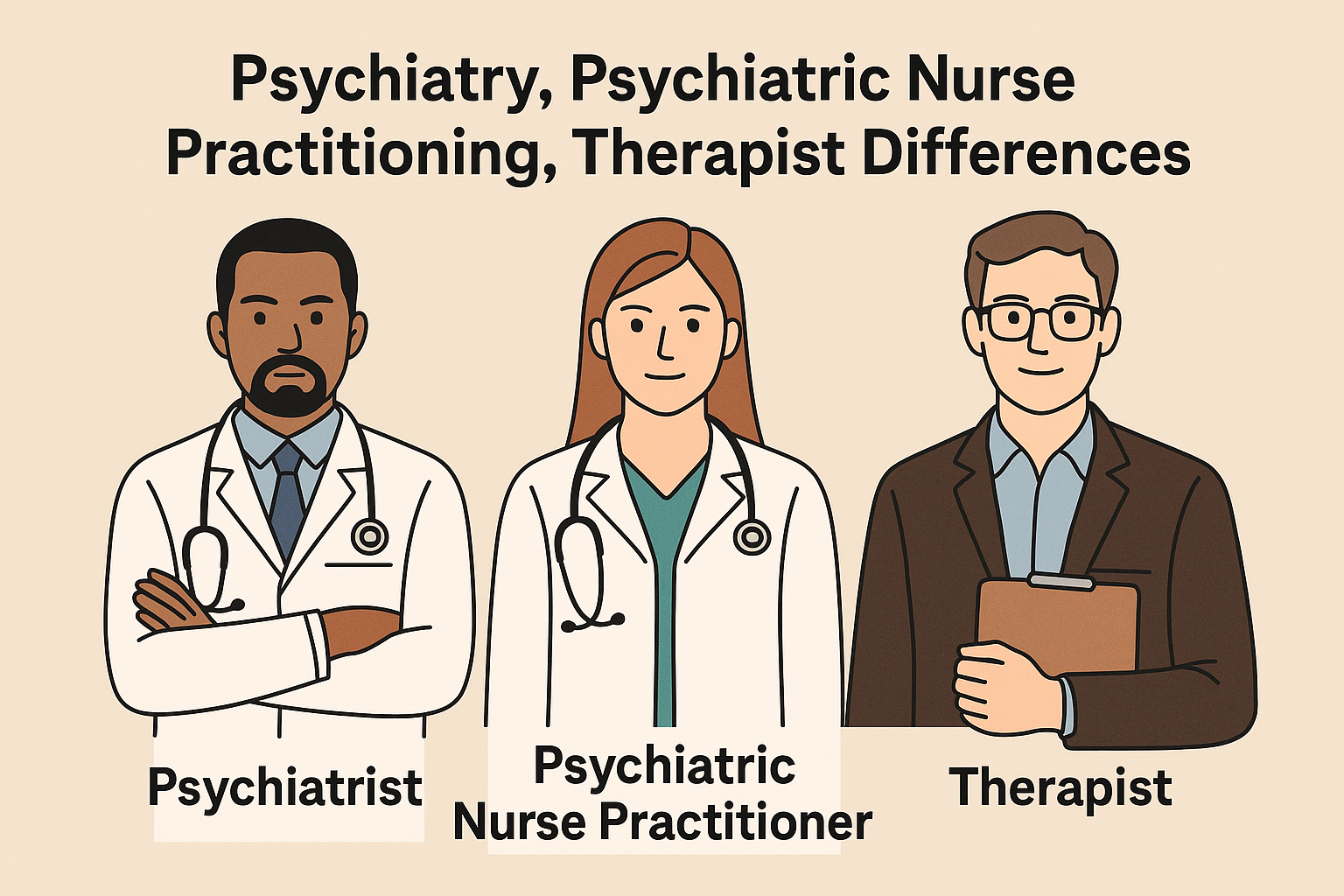November 4, 2025
Understand the differences between psychiatrist, psychiatric nurse practitioner and therapist—and choose the right mental-health provider for you.

In today’s landscape of mental-health care, many individuals and families wonder: what’s the difference between seeing a psychiatrist, a psychiatric nurse practitioner (often abbreviated PMHNP), or a therapist? Understanding the distinctions—especially in relation to conditions such as depression, anxiety, ADHD, OCD, schizophrenia, borderline personality disorder (BPD), psychosis and eating disorders—is vital for selecting the right level of care and building an integrated treatment plan.
“Psychiatry” refers to the medical specialty concerned with diagnosing, treating and preventing mental, emotional and behavioural disorders. A psychiatrist is a medical doctor (MD or DO) with specialized residency in psychiatry. They can prescribe medications, monitor physical health effects of mental-illness and order lab tests or imaging when needed.
For conditions such as schizophrenia, bipolar disorder, psychosis, and complex comorbidities (for example eating disorders plus medical complications), psychiatry plays a central role.
A psychiatric-mental health nurse practitioner is an advanced practice nurse (APRN) who holds a master’s or doctoral nursing degree specializing in psychiatry/mental-health nursing. They are trained to assess, diagnose, treat mental-health conditions, and in many states prescribe medications.
Although the training path is shorter than a psychiatrist’s, the scope can overlap significantly—especially when prescribing is within the state scope.
PMHNPs often adopt a holistic nursing approach and may work collaboratively with psychiatrists, therapists and other providers to manage care.
“Therapist” is a broad term covering licensed mental health professionals (e.g., psychologists, licensed clinical social workers, licensed professional counselors) who provide psychotherapy: talk-therapy, behavioural interventions, coping skills, relationship work, and mental-wellness support.
Therapists generally cannot prescribe medications (except in rare jurisdictions with specific licensing). Their focus is primarily emotional, behavioral and relational rather than biomedical.
When you might start with a therapist:
When to consider a PMHNP or psychiatrist:
Choosing between PMHNP vs psychiatrist:
Here we briefly link how the provider differences matter across common conditions:
From an integrative mental-health perspective—such as our vision at Integrative Psych—optimal outcomes often come from collaborative care models, where psychiatrists, PMHNPs and therapists work as a coordinated team. The provider differences we’ve outlined become strengths when leveraged together: medication management + psychotherapy + behavioral skills + lifestyle/psychosocial support.
For a practice or private-practice clinic in NYC or Miami, clearly explaining these distinctions to patients improves transparency, patient satisfaction, treatment adherence and SEO conversion (as individuals search for “therapist near me,” “psychiatrist for ADHD NYC,” “psychiatric nurse practitioner anxiety Miami,” etc.). Indeed, SEO strategy for mental-health practices recommends service pages targeting these roles and conditions.
At Integrative Psych, our mission is to provide world-class, integrated mental-health care across New York City (Chelsea) and Miami. Our clinical team includes board-certified psychiatrists, psychiatric-mental-health nurse practitioners, licensed therapists and specialists in evidence-based therapies (CBT, DBT, EMDR) and medication management. We emphasise coordinated, patient-centered care where each provider’s unique role is optimised for your healing journey. If you’re seeking a practice where provider differences are leveraged for stronger outcomes, we invite you to explore our team and schedule an appointment today.

We're now accepting new patients
